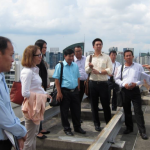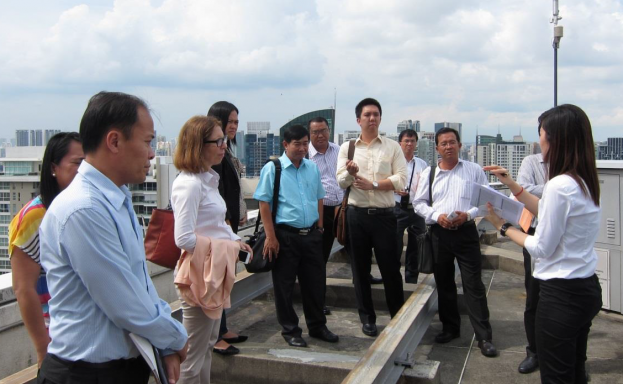How to Improve Air Quality in Your City: Strategic Framework for Air Quality Management Train-for-Clean-Air 1 (T4CA1)

In conjunction with the World Cities Summit, the regional workshop on “How to Improve Air Quality in Your City: Strategic Framework for Air Quality Management” took place in Singapore on 2-3 June 2014. The training is a flagship course and is one of five training modules developed under the regional training program, “Train-for-Clean-Air” (T4CA). It aims to create awareness and provide decision-makers with knowledge and information on air quality management in non-metropolitan areas and secondary cities.
The twelve high-level decision-makers at the city, national, and regional levels from seven ASEAN member countries, namely Cambodia, Thailand, Lao PDR, Viet Nam, Philippines, and Myanmar were welcomed by Ms. Sharon Chan, Technical Cooperation Deputy Director of the Ministry of Foreign Affairs-Singapore and Ms. Napaporn Yuberk, Regional Project Manager of the German International Cooperation (GIZ).
The two-day workshop was facilitated by regional experts: Dr. SupatWangwongwatana, Coordinator of the Acid Deposition Monitoring Network in East Asia (EANET), and Bluetrack Centre’s Erik Velasco, Ph.D., and Ms. Maria Chiara Metallo of Environ. It included a half-day site visit to the National Environment Agency (NEA), where participants were briefed on the policies and regulations on air quality management in Singapore. They also had the opportunity to visit one of the eleven ambient air quality monitoring sites in the country, which enabled them a first-hand glimpse of Singapore’s experience in air quality management.
The training ended with a visit to the Land Transport Authority (LTA), where efforts and initiatives to improve public transport and reduce emissions from the transport sector in Singapore were presented. Participants experienced the history and future of land transport in the country through LTA’s interactive Land Transport Gallery.
The activity was organized by the project ‘Clean Air for Smaller Cities in the ASEAN Region’ which aims to empower local governments to develop and implement Clean Air Plans (CAPs) with the participation of the private sector, academia, and members of civil society. The project is funded by the German Federal Ministry for Economic Cooperation and Development (BMZ) and implemented by GIZ together with the ASEAN Secretariat.
Through a Grant Agreement funded by BMZ with Clean Air Asia and channeled through GIZ, Clean Air Asia is supporting its implementation and is helping ensure sustainability of outcomes beyond 2015. The training was co-organized with Clean Air Asia.

Since 2009, GIZ, financed through the German Federal Ministry for Economic Cooperation and Development (BMZ), has been working with the ASEAN Working Group on Environmentally Sustainable Cities (AWGESC) in the project “Clean Air for Smaller Cities in the ASEAN Region” (CASC). Its objective is to support small and medium sized cities to develop and implement Clean Air Plans (CAPs). The CAP development incorporates a high degree of public and private sector participations. CASC also developed a standardised modular air quality management (AQM) training called “Train for Clean Air” (T4CA). So far, the project has developed five priority courses (e.g. air quality management and air quality monitoring techniques) for different target populations such as decision makers, technical officers, and influencers.
Currently, the project works in ten cities in seven ASEAN Member States: Cambodia (Phnom Penh), Indonesia (Palembang, Surakarta), Laos PDR (Vientiane), Malaysia (Melaka), Philippines (Cagayan de Oro, Iloilo), Thailand (Chiang Mai, Nakon Ratchasima), and Vietnam (Bac Ninh).
For more info, please visit http://www.citiesforcleanair.org/






